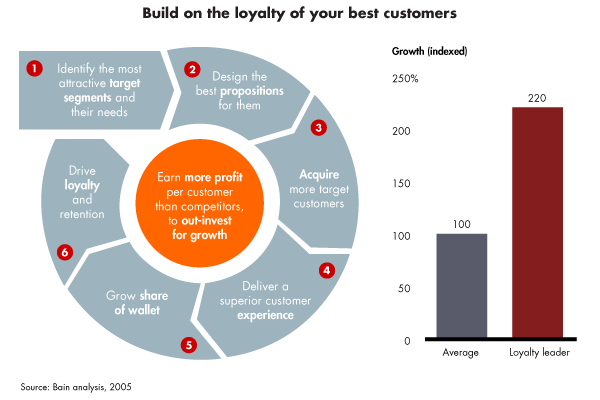贝恩观点《如何在经济动荡中制胜》 2009年3月
作者:Rob Markey, Darrell Rigby
忠实的客户对企业的服务更容易满足。他们只愿意把花钱在他们信任的公司身上。而且,他们还会口口相传,帮助公司增加业务。客户的忠诚度能为企业带来强大的优势,这也有助于解释为什么最大的市场份额格局变化发生在经济动荡时期。
Economic downturns wreak havoc with customer relationships. Deep cost-cutting compromises service. Layoffs and pay freezes leave front-line employees demoralized. To make up for lost revenues, companies sometimes look for ways to tack on new charges and fees, which make customers feel they are being gouged.
Some companies tolerate this abuse of customers as unfortunate collateral damage in a recession. After all, aren't competitors exploiting customers, too? But the negative effects of lost customer trust can be deep and long-lasting. And the advantages of loyalty are even more pronounced in a downturn. Loyal customers cost less to serve. They typically concentrate more of their spending with companies they trust to meet their needs and treat them well. They are less likely to defect than shoppers whose attachment to a company is no deeper than the latest price discount. Loyal customers also help stretch marketing dollars. Their word-of-mouth referrals to friends and associates provide a company with more like-minded customers, laying the foundation for growth when the economy turns around.
The powerful advantages of customer loyalty help explain why the biggest changes in market share occur during downturns. Many companies do well when consumer spending rises and the economy is expanding. But when spending drops, the companies focused on protecting and growing their most loyal, profitable customer segments often manage to stabilize their business. They may even attract new customers as competitors falter. Until the equity markets began to slide in 2008, for example, mutual fund companies of nearly all stripes prospered. Many investors chased hot returns, and many fund companies were happy to oblige them with an array of trendy offerings. But as returns dropped, customers quickly sold their shares. That didn't happen at Vanguard. The pioneer of market index investing remained focused on keeping costs low, offering funds with clear, easy-to-understand investment strategies, and maintaining great service. That approach has once again enabled Vanguard to outperform competitors during this recession: In 2008, Vanguard enjoyed net cash inflows of $71 billion compared with net outflows of $225 billion for the rest of the industry, according to the Investment Company Institute. And Vanguard continues to gain market share, as it has done through market downturns over more than 25 years.
But maintaining customer loyalty in a downturn is a difficult challenge. Nearly all customers, including the most loyal, are more sensitive to price than before. Aggressive rivals may try to lure them with discounts and rebates. If you aren't the low-cost provider in your industry, you may not be able to match those price cuts. And as we'll explain, that may not be the best strategy in any case. Most people buy on value, not price alone. But the situation does require new strategic thinking. How have your customers' preferences changed? How long will those changes last? How can you appeal to their new needs without diluting your long-term competitive advantage?
In our experience, the companies that answer those questions effectively and strengthen loyalty in a downturn share some common characteristics.
● They steer clear of some deadly traps, such as trying to appeal to every potential customer group, often through aggressive discounting, indiscriminate cost-cutting, and reducing investment in customer-focused innovation.
● They avoid confusion about their customer “sweet spot”—the customers who matter most to the success of their business—and selectively add segments that extend and reinforce the target without diluting the brand or adding costly complexity.
● They ensure that those customers have the best possible experiences where it counts the most.




 微博
微博 微信
微信